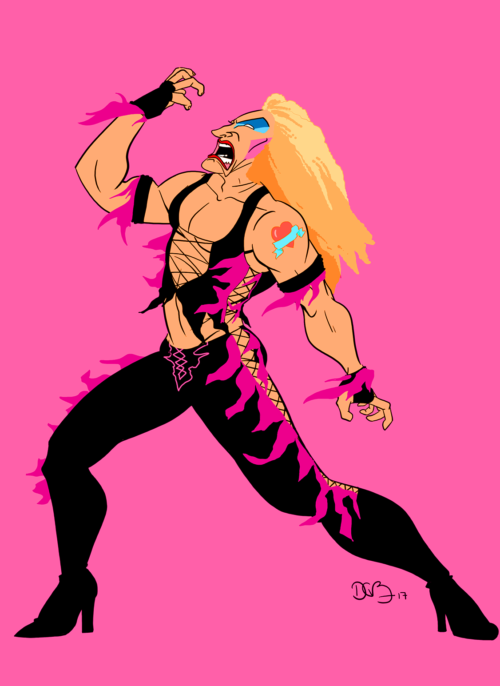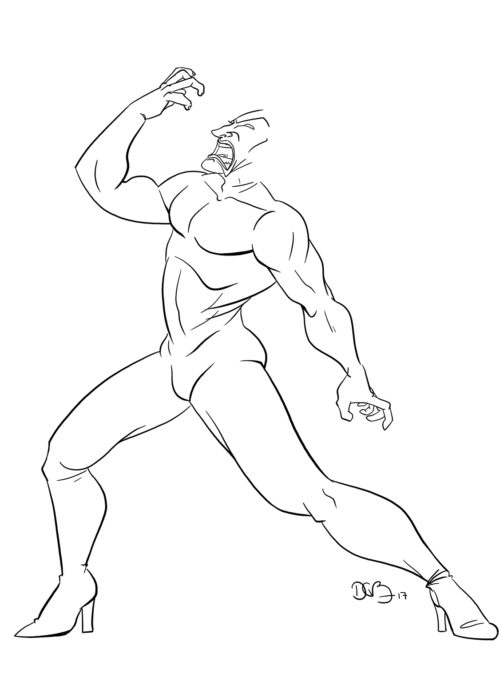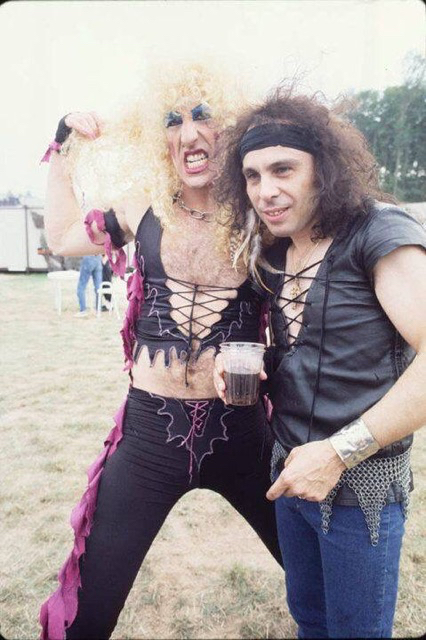Sketch Fridays #43 – Dee Snider

Sketch Friday #43 – Dee Snider.
Dee Snider is one of the most important people in my life. Specifically, his time with his ’80s heavy metal band, Twisted Sister, made such an impact on my developing young mind that I tend to not share my love for them and their music because I feel it was music made specifically for me and other people wouldn’t understand. Simply because of my anachronistic appreciation, I’m not totally wrong.
In fairness, my appreciation of the band was anachronistic from the start. I found them––with friend and fellow artist, Josh Tobey––when I was thirteen years-old in the summer of 1994. Josh had found, on the side of a dirt road in the rural areas of Nipomo, CA, a paper shopping bag full of cassette tapes minus any defining cases or liner notes. We spent the afternoon playing games on the Nintendo Entertainment System––on Josh’s trusty, tiny black-and-white tv––listening to tape after tape. Furthermore, we listened to the tapes at faster speed than normal. We found we could lean this heavy teddy bear on the fast-forward button of the cassette player while a tape was playing, which made every tape sound like Alvin and the Chipmunks.

Figure drawing for this week’s Sketch Friday.
In the bag was Twisted Sister’s third album, Stay Hungry, their 1984 breakthrough album with the MTV hits, “We’re Not Gonna Take It” and “I Wanna Rock.” By ’94, the band had been broken up for seven years, though most had not heard about that band since 1985 when Dee Snider spoke to the Senate to defend free speech in music from censorship. Despite releasing one album after that, it tanked and the band called it quits, as Dee Snider has said, with a whimper rather than a roar. But, again, they were merely a cassette tape in a bag with dozens of others. So, for a long while, I had no idea what they looked like or even when they were doing their work. All I had was the sound and the words sung by Mr. Snider. From those I shaped an opinion and, ultimately, a devotion.
But how the band ended didn’t matter to me. Their album was just a tape in a bag and was meant to be a means to laugh through the afternoon. And it was until we hit the second to last song on the album, called “The Beast.” It’s a song propelled by a chugging, droning riff that mimics a wolf’s steady stride pursuing prey through a forest. It was confident, predatory, and decidedly metal––a sound and attitude that spoke to my teenage ears.
“The Beast” is a song of horror-infused metaphor and minor-key melodramatics. As soon as it ended, Josh and I broke away from whatever video game we were playing and stared at each other, the power of the song, even at 2x speed, hooked us and, for the first time, we stopped the tape and rewound it to hear the song again.

Dee Snider with Dio. Probably from 1983 or early ’84. Photographer likely Fin Costello.
It marked the beginning of my love for the band. It started completely from a superficial fascination and developed into a nigh-spiritual battle cry that, to this day, informs everything I think, do, and believe. Dee Snider is best described as my “spirit animal.” His tenacity and ferocity underpin my natural reserve and personality. When I break out from my hesitancy, it is under the guidance of “What would Dee Snider do?” Not because he is a religious figure (he’s not), not because he’s the world’s greatest artist (he’s not). It was his voice that first said to me, “It’s okay to be you. No matter what. Forget what anybody else says or decrees. You’re different, and that’s okay. Because you’re one of us.” Such a simple message––spoken through songs like “We’re Not Gonna Take It”, “Don’t Let Me Down”, or “SMF” from Stay Hungry––meant the world to me and got my mind out of a pretty dark place and guided me when I needed guidance most. This is not only the case when I was thirteen, but at various points as I aged and continues to be the baseline I fall back to today.
Despite being a gregarious loudmouth, Dee and Twisted represented individuality in the face of conformity, especially in the mold of those who felt they weren’t able to conform despite their best efforts––a pretty good description of me in my teens. But he backed up his musical claims by taking it as far as testifying in front of the Senate in an articulate and sober argument with which anybody today would not disagree. His art means the world to me, but even more his adherence to principle above all else undoubtedly shaped everything I want to be, despite being almost ten years too late to his music.
I know many people may raise an eyebrow with this revelation, not seeing the pieces connect. While I’m not particularly gregarious or outspoken, this band and most importantly their message is the foundation for who I wanted to be and, I feel, who I became. For the following four weeks, I’ll be interpreting each member of this band in my style, reflecting their individual personality and showing, with hope, my appreciation with each drawing.

Discussion (3) ¬